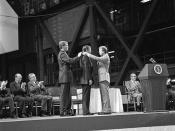Notes on euphemisms
Abstract
The purpose of this work is to reveal some general aspects of the English euphemisms, along with short notes on their history and their diachronical evolution. At the end of the paper, there are sketched the origin and evolution of some commonly used euphemisms.
The origin of the word is traced-back from the Gk. euphemismos "use of a favorable word in place of an inauspicious one," from euphemizein "speak with fair words," from eu- "good" + pheme "speaking," from phanai "speak". In ancient Greece, it was the superstitious avoidance of words of ill-omen during religious ceremonies, or substitutions such as Eumenides "the Gracious Ones" for the Furies. In Eng.lish, a rhetorical term at first; broader sense of "choosing a less distasteful word or phrase than the one meant" is first attested 1793.
Euphemism and historical linguistics
Historical linguistics has revealed traces of taboo deformations in many languages.
Several are known to have occurred in Indo-European, including the original Indo-European words for bear (*rktos), wolf (*wlkwos), and deer (originally, hart). In different Indo-European languages, each of these words has a difficult etymology because of taboo deformations - a euphemism was substituted for the original, which no longer occurs in the language. An example is the Slavic root for bear-*medu-ed-, which means "honey eater".
In some languages of the Pacific, using the name of a deceased chief is taboo. Since people are often named after everyday things, this leads to the swift development of euphemisms. These languages have a very high rate of vocabulary change.
Classification of euphemisms
Many euphemisms fall into one or more of these categories:
Terms of foreign origin (derriere, copulation, perspire, urinate security breach, mierda de toro, prophylactic, faeces occur, sheist)
Abbreviations (SOB for "son of a bitch", RIF for "reduction in force", IRIF for "involuntary reduction in force", ASBO for "Anti-Social Behaviour Order", pee for "piss", eff (as in "eff off!) for "fuck (off)", )
Abstractions (it, the situation, g, deed for "act of murder/rape" perspiration, urination, micturition, defecation, disorder, chaos, disarray, going to the other side, tired and emotional, do it or come together )
Indirections (behind, unmentionables, privates, live together, go to the bathroom, sleep together)
Mispronunciation (goldarnit, freakin, dadgummit, shoot, shite, slight, snails, fug )
Litotes or reserved understatement (not exactly thin for "fat", not completely truthful for "lied", not unlike cheating for "an instance of cheating")
There is some disagreement over whether certain terms are or are not euphemisms. For example, sometimes the phrase visually impaired is labeled as a politically correct euphemism for blind. However, visual impairment can be a broader term, including, for example, people who have partial sight in one eye, a group that would be excluded by the word blind.
The evolution of euphemisms
Euphemisms may be formed in a number of ways. Periphrasis or circumlocution is one of the most common - to "speak around" a given word, implying it without saying it. Over time, circumlocutions become recognized as established euphemisms for particular words or ideas.
To alter the pronunciation or spelling of a taboo word (such as a swear word) to form a euphemism is known as taboo deformation. There are an astonishing number of taboo deformations in English, of which many refer to the infamous four-letter words. In American English, words which are unacceptable on television, such as fuck, may be represented by deformations such as freak - even in children's cartoons. Some examples of Cockney rhyming slang may serve the same purpose - to call a person a berk sounds less offensive than to call him a cunt, though berk is short for Berkshire Hunt which rhymes with cunt.
Bureaucracies such as the military and large corporations frequently spawn euphemisms of a more deliberate (and to some, more sinister) nature. Organizations coin doublespeak expressions to describe objectionable actions in terms that seem neutral or inoffensive. Militaries at war frequently do kill people, sometimes deliberately and sometimes by mistake; in doublespeak, the first may be called neutralizing the target and the second collateral damage. Likewise, industrial unpleasantness such as pollution may be toned down to outgassing or runoff - descriptions of physical processes rather than their damaging consequences. Some of this may simply be the application of precise technical terminology in the place of popular usage, but beyond precision, the advantage of technical terminology may be its lack of emotional undertones, while the disadvantage being the lack of real life context.
The origin and meaning of some common euphemisms
On Carey Street: being bankrupt or in debt.
Origin
This phrase originates from the London Street where the UK bankruptcy court used to be located. The court moved to Carey Street in the 1840s but the phrase didn't emerge as a synonym for bankrupt until much later. The first reference found is a piece by James Agate, in The Saturday Review from 1922:
"The melancholy gentleman in direful Carey Street."
It is sometimes suggested that the term Queer Street is a slang synonym for Carey Street. That's not so however, as the use of that phrase pre-dates the court's move to Carey Street and, in any case, the two phrases don't mean quite the same thing.
Differently abled: handicapped or disabled.
Origin
This term was coined by the US Democratic National Committee in the early 1980s as a more acceptable term than handicapped (or, in the UK, disabled). The motivation seems to have been both a genuine attempt to view the people previously called handicapped in a more positive light and also as need to be seen as politically correct. The Los Angeles Times reported it this way in 1985:
"In a valiant effort to find a kinder term than handicapped, the Democratic National Committee has coined differently abled. The committee itself shows signs of being differently abled in the use of English."
Economical with the truth: conveying an untrue version of events by leaving out the important facts. A euphemism for lying, in short.
Origin
Recorded from the 18th century, although rarely used. It was brought into the contemporary language by the UK Cabinet Secretary, Sir Robert Armstrong, who used the phrase during the Australian 'Spycatcher' trial in 1986.
Lawyer: What is the difference between a misleading impression and a lie? Armstrong: A lie is a straight untruth. Lawyer: What is a misleading impression - a sort of bent untruth? Armstrong: As one person said, it is perhaps being "economical with the truth".
What Armstrong left out (perhaps he knew but was being economical) was that the 'one person' was Edmund Burke. In 1796 Burke wrote:
"Falsehood and delusion are allowed in no case whatsoever: But, as in the exercise of all the virtues, there is an economy of truth."
In 1992, Alan Clark was cross-examined during the Matrix Churchill case and embroidered the phrase a little:
Clark: Well it's our old friend "being economical", isn't it? Lawyer: With the truth? Clark: With the actualité
In an interesting condition: a euphemism for pregnant.
Origin
'Interesting' has been used since the 18th century as a euphemism for pregnant. Women were said to be in an interesting state or interesting situation and subsequently of course there was an interesting event (childbirth). For example:
Tobias Smollett, Roderick Random, 1748 - "So that I cannot leave her in such an interesting situation, which I hope will produce something to crown my felicity."
Charles Dickens Nicholas Nickleby, 1838 - "Mrs. Lenville (who, as has been before hinted, was in an interesting state)."
Westmorland Gazette, June 1899 "'Interesting event' at Peterhof. Another daughter!"
It was in America that we find the first reference to an interesting condition as a euphemism for pregnant. The Hagerstown Torch Light printed the phrase in an edition in September 1846:
... "The elopement of a blacksmith named Samuel Fellows and a Mrs. Betsey Reynolds. Mrs. Reynolds is about 31 years of age, and is good looking. She took her family of five children with her. She was also in an interesting condition. Fellows took his two children - making quite an interesting company."
Like the Dickens: a lot; as in 'hurts like the dickens'.
Origin
It has nothing to do with Charles Dickens. Dickens is a euphemism for the word devil, possibly via devilkins. Shakespeare used it in 'the Merry Wives of Windsor: 'I cannot tell what the dickens his name is my husband had him of.'
The smallest room in the house: coy reference to a lavatory.
Origin
Used by Sir Winston Churchill in a reply to an unwelcome letter. 'Dear Sir, I am in the smallest room of the house and your letter is before me. Very soon it will be behind me.
Put on the wooden overcoat: die.
Origin
The 'wooden overcoat' is, of course, the coffin. This colloquial phrase isn't recorded in many reference works and the origin is uncertain. It appears to be American in origin and most of the early printed citations come from the USA. The earliest that I can find is this piece from the Ohio newspaper The Coshocton Democrat, May 1870:
"If you want to get blowed up - if your life is insured in your wife's name and you want her to have the money immediately - buy some new-fangled burning fluid that is remarkable for its cheapness. There is no surer way of getting yourself into a wooden overcoat."
Bibliography:
Benveniste, ÃÂmile, Euphémismes anciens and modernes, in: Problèmes de linguistique générale, vol. 1, pp. 308-314. [Originally published in: Die Sprache, I (1949), pp. 116-122].
Rawson, Hugh, A Dictionary of Euphemism & Other Doublespeak, second edition, 1995.
McGlone, M.S., Beck, G., & Pfiester, R.A. (2006), Contamination and camouflage in euphemisms, in Communication Monographs, 73, 261-282.


